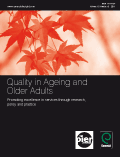
Quality in Ageing and Older Adults
Scope & Guideline
Enhancing Lives Through Innovative Research
Introduction
Aims and Scopes
- Interdisciplinary Research on Aging:
The journal emphasizes the importance of integrating diverse disciplines, including health sciences, social sciences, and humanities, to address complex issues faced by older adults. - Community Engagement and Participation:
A strong focus is placed on participatory research methods that involve older adults and caregivers in the research process, ensuring their voices and experiences shape the findings. - Health and Well-being Interventions:
The journal publishes studies evaluating various interventions aimed at improving physical, mental, and emotional well-being among older populations. - Age-Friendly Environments:
Research on the design and accessibility of community spaces that support the social engagement and independence of older adults is a core theme. - Dementia Care and Support:
A consistent focus on dementia-related issues, including caregiving strategies, support programs, and innovative therapeutic approaches. - Social and Cultural Dimensions of Aging:
Exploration of how social, cultural, and experiential factors impact the aging process and the quality of life for older adults.
Trending and Emerging
- Impact of COVID-19 on Older Adults:
There is a growing body of research examining the effects of the COVID-19 pandemic on older adults, including their mental health, social isolation, and access to care, highlighting the need for resilience and adaptability in aging services. - Technology and Aging:
Emerging studies on gerontechnology and the role of digital tools in enhancing the lives of older adults are becoming prominent, as technology adoption continues to influence social connectivity and independence. - Mental Health and Well-being:
A rising emphasis on the mental health of older adults, particularly regarding depression, life satisfaction, and coping strategies, reflects a broader understanding of health that encompasses emotional well-being. - Intergenerational Relationships:
Research exploring the dynamics of intergenerational living and support systems is increasing, emphasizing the importance of familial and community connections in aging. - Participatory Action Research:
An increasing trend towards participatory action research methodologies highlights the importance of involving older adults in the research process, fostering empowerment and relevance in findings.
Declining or Waning
- Traditional Medical Approaches to Aging:
There appears to be a waning interest in conventional medical models of aging, with a shift towards more holistic and person-centered approaches that consider the social and emotional aspects of aging. - General Population Studies:
Research focusing solely on general aging trends without specific contextual factors or targeted interventions is becoming less prominent, as the journal leans towards more nuanced and specific studies. - Single-Dimensional Health Metrics:
The focus on isolated health metrics without considering the broader social determinants of health for older adults has diminished, reflecting a more integrated approach to health assessments.
Similar Journals

RASP-Research on Ageing and Social Policy
Transforming Perspectives on Ageing Through ResearchRASP - Research on Ageing and Social Policy is a distinguished journal dedicated to exploring the intricate relationship between ageing populations and societal change. Published by HIPATIA PRESS and featuring an Open Access model since 2013, this journal provides invaluable insights into various aspects of social policy as it relates to older adults. As a platform for rigorous academic research, RASP caters to an interdisciplinary audience of researchers, professionals, and students, promoting the exchange of innovative ideas and evidence-based practices. The journal aims to influence policy-making and practice, ensuring that the voices of ageing populations are heard and prioritized in social discourse. With a commitment to high-quality scholarship and a focus on global and local challenges, RASP stands out as a crucial resource for those engaged in the study of ageing and social policy dynamics.
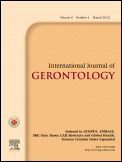
International Journal of Gerontology
Championing research that shapes the future of geriatric care.International Journal of Gerontology is a distinguished peer-reviewed journal dedicated to advancing the field of gerontology and addressing the multifaceted challenges associated with aging. Published by the Taiwan Society of Geriatric Emergency & Critical Care Medicine, this innovative journal has been an open-access platform since 2018, ensuring that vital research is accessible to a global audience. With an ISSN of 1873-9598, it serves as a crucial resource for researchers and practitioners focused on the biological, psychological, and social aspects of aging. The journal is indexed in Scopus with a rank of #103/116 in the Medicine category (Geriatrics and Gerontology) as of 2023, placing it in the Q4 quartile—a testament to its evolving impact in the field. Spanning works published from 2007 to 2024, the International Journal of Gerontology facilitates the dissemination of critical research findings and clinical practices that inform and enhance geriatric care and research methodologies.

Gerontology and Geriatric Medicine
Exploring the complexities of aging with interdisciplinary studies.Gerontology and Geriatric Medicine is a distinguished journal published by SAGE Publications Inc, focusing on the vital field of gerontology and geriatrics. With an impressive Q2 ranking in Geriatrics and Gerontology as of 2023, this journal serves as a crucial platform for disseminating high-quality research and innovation related to aging and elderly care. Since embracing an Open Access model in 2015, it has broadened its reach, enabling scholars, researchers, and practitioners worldwide to access valuable insights without barriers. The journal’s scope encompasses a variety of interdisciplinary studies that address the multifaceted aspects of geriatric medicine, making it an essential resource for anyone dedicated to advancing knowledge and practices in this critical domain. With its commitment to enhancing the understanding of aging populations, Gerontology and Geriatric Medicine is poised to contribute significantly to the ongoing discourse and research developments in the care for older adults.

Advances in Gerontology
Shaping Practices for a Greying WorldAdvances in Gerontology is a pivotal academic journal dedicated to the field of gerontology, published by PLEIADES PUBLISHING INC. With its ISSN 2079-0570 and E-ISSN 2079-0589, this journal serves as an essential platform for researchers, healthcare professionals, and students focused on aging and related health issues. Although currently not an open-access journal, it aspires to enrich the scholarly community by disseminating high-quality research from 2011 through 2024. The journal is recognized in the lower quartile of its category, ranking Q4 in both Geriatrics and Gerontology, reflecting its commitment to addressing emerging topics in the aging population despite its lower visibility in the competitive landscape. As it continues to explore critical areas in gerontology, Advances in Gerontology invites contributions that advance knowledge, foster understanding, and inform practices within this essential field of study.

JOURNAL OF GERONTOLOGICAL SOCIAL WORK
Elevating social work practices for aging populations.The JOURNAL OF GERONTOLOGICAL SOCIAL WORK, published by Routledge Journals, Taylor & Francis Ltd, serves as a pivotal platform in the multidisciplinary study of gerontology, specifically focusing on social work practices affecting older adults. Since its inception in 1979, the journal has cultivated a robust collection of scholarly articles that address critical issues in aging, incorporating diverse perspectives from nursing, social sciences, and social work disciplines. Currently, the journal holds esteemed rankings within various categories, including Q2 in Nursing (miscellaneous) and Q1 in Social Sciences (miscellaneous), showcasing its influence and relevance in the field. With its high Scopus ranking—#96 out of 604 in Social Sciences and #9 out of 45 in Nursing—this publication is essential for researchers and practitioners aiming to improve service delivery and practices surrounding elderly care. Though not offering open access, its contributions are nonetheless invaluable for fostering scholarly dialogue and advancing knowledge within gerontological social work. The journal's emphasis on evidence-based practice, innovative research methodologies, and policy implications makes it a critical resource for anyone committed to enhancing the lives of older populations.
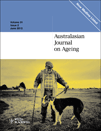
AUSTRALASIAN JOURNAL ON AGEING
Innovating solutions for the challenges of ageing.Australasian Journal on Ageing, published by Wiley, is a leading academic journal dedicated to advancing the understanding of ageing processes and promoting health and well-being in older populations. With an ISSN of 1440-6381 and E-ISSN 1741-6612, this journal serves as a vital resource for researchers and practitioners in the fields of Community and Home Care, Geriatrics and Gerontology, and broader Medical disciplines. Since its inception in 1998, the journal has showcased high-quality research and innovative approaches to the challenges of ageing, as evidenced by its Q2 and Q3 rankings across relevant categories in 2023. With a focus on practical implications and interdisciplinary collaboration, the Australasian Journal on Ageing is instrumental in shaping policies and practices that enhance the quality of life for older adults. Notably, it is ranked highly in the Nursing community and maintains a strong position in geriatric research, making it an essential outlet for scholarly work that influences real-world outcomes.
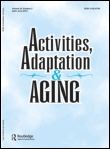
Activities Adaptation & Aging
Exploring adaptations for healthier aging journeys.Activities Adaptation & Aging is a leading journal dedicated to the intersection of aging research, health professions, and gerontology, published by Routledge Journals, Taylor & Francis Ltd. With its origins dating back to 1981, this journal has established itself as a vital resource for scholars and practitioners alike, focusing on innovative approaches to enhance the quality of life for older adults. The journal’s inclusion in various prestigious Scopus ranks—such as being positioned in the 92nd percentile for Health Professions (miscellaneous)—reflects its significant impact in the field. Operating without open access, it provides essential insights and empirical research that are crucial for advancing knowledge and practices related to adaptation and engagement in aging. With a strong reputation built over the decades, Activities Adaptation & Aging continues to be an essential platform for disseminating research findings, fostering scholarly dialogue, and promoting effective interventions for aging populations.

Geriatrie et Psychologie Neuropsychiatrie du Vieillissement
Advancing the Understanding of Aging and Mental HealthGeriatrie et Psychologie Neuropsychiatrie du Vieillissement is a pivotal academic journal dedicated to the multidisciplinary study of aging, encompassing the fields of geriatrics, neuropsychiatry, and psychological health in the elderly population. Published by JOHN LIBBEY EUROTEXT LTD, this journal fosters knowledge dissemination and innovation, contributing to the understanding of the complexities faced by aging individuals. With a broad scope that includes biological psychiatry and neuropsychology, it serves as a vital resource for researchers, healthcare professionals, and students engaged in geriatric medicine and mental health. Although currently classified in the Q4 category across various relevant medical and psychological disciplines, the journal addresses critical topics that are essential for enhancing quality of care and improving patient outcomes. Additionally, the journal is accessible via open access options, promoting wide-ranging readership and collaboration within the academic community. As the field continuously evolves, Geriatrie et Psychologie Neuropsychiatrie du Vieillissement remains commited to pushing the boundaries of research and practice in gerontology and neuropsychiatry.
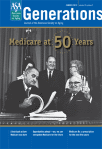
Generations
Connecting Research and Practice Across LifetimesGenerations, published by the American Society on Aging, serves as a vital interdisciplinary platform for scholars and practitioners within the field of aging and gerontology. With its ISSN of 0738-7806 and E-ISSN of 2694-5126, this journal has been a valuable resource since its inception in 1985, connecting research and practice across converging years and advancing discussions surrounding the complexities of aging and lifespan studies. Although classified in the Q4 quartile for categories such as Geriatrics and Gerontology, Life-span and Life-course Studies, and Public Health, its contributions are increasingly relevant in a rapidly aging society. The journal’s emphasis on critical issues surrounding aging makes it essential reading for health professionals, policy makers, and researchers dedicated to enhancing the quality of life for older adults. As it continues its publication journey up to 2024, Generations remains committed to fostering scholarly discourse and offering innovative insights in this crucial area of study.

Research in Gerontological Nursing
Empowering Nurses to Enhance Elderly Well-BeingResearch in Gerontological Nursing is a premier peer-reviewed journal dedicated to advancing the field of nursing as it intersects with gerontology. Published by SLACK INC, this influential journal provides an essential platform for researchers, clinicians, and educators focusing on the health and well-being of older adults. Since its inception in 2008, it has fostered critical discourse and innovation, bridging gaps between nursing practices and gerontological research. The journal proudly holds a Q3 ranking in both Geriatrics and Gerontology as well as Health Policy, and a Q2 ranking in miscellaneous Nursing categories as of 2023, reflecting its commitment to quality and relevance in these vital areas of study. While not open access, the journal offers a subscription-based model that guarantees readership and citation within the academic community. With its Scopus rankings highlighting its growing impact—ranked #23 in Nursing Gerontology and #59 in General Nursing—Research in Gerontological Nursing serves as an indispensable resource for those dedicated to improving care for the aging population.